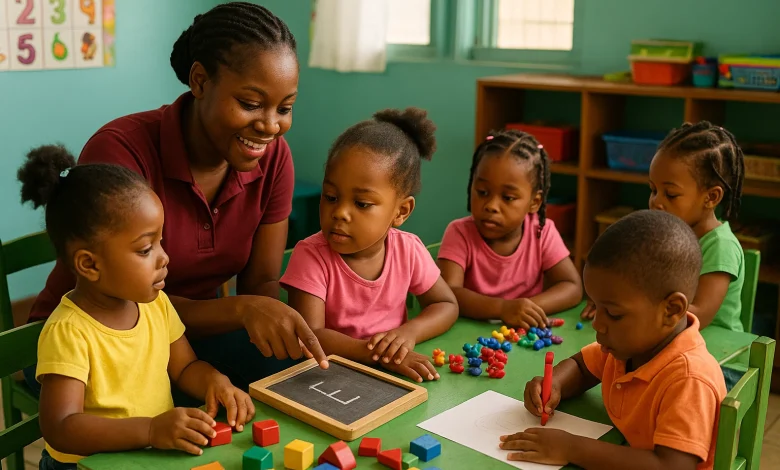Early Childhood Education in Dominica

Early Childhood Education in Dominica is a cornerstone of the nation’s education and social development system, covering structured care and learning for children from birth to five years old. It is widely regarded as a vital stage in shaping future literacy, numeracy, cognitive, and social outcomes. Over the past four decades, Dominica has steadily expanded its early childhood education (ECE) network, guided by regional collaboration under the OECS Education Sector Strategy (OESS) and by international frameworks such as the UN Sustainable Development Goals (SDGs).
Historical Development and Policy Framework
The roots of early childhood education in Dominica can be traced to the 1970s, when small community-based preschools and day-care centers began appearing in villages and towns. These were often established by churches, local leaders, and non-governmental organizations to support working families. At the time, there was little formal government oversight, and provision varied widely in quality.
By the 1990s, the Ministry of Education had recognized the importance of ECE in national development. Early initiatives focused on introducing minimum standards for preschools and creating links between early childhood care and the formal primary system. A turning point came with the creation of the Early Childhood Unit within the Ministry of Education in the early 2000s. This unit assumed responsibility for licensing institutions, monitoring quality, and setting qualifications for early childhood educators.
Legislation such as the Education Act provided the legal basis for government intervention in ECE. More recently, the Education Sector Plan 2021-2025 placed early childhood education at the center of national education priorities, emphasizing access, equity, and quality. Importantly, Dominica’s plan is explicitly aligned with the OECS Education Sector Strategy (OESS), which sets out shared goals across the Eastern Caribbean.
Access, Infrastructure, and Curriculum
ECE provision in Dominica is delivered through a combination of public, private, and community-run preschools. The majority of preschools are privately operated, particularly in urban areas such as Roseau and Portsmouth, but the government supports community centers and provides subsidies in rural parishes to expand access.
The curriculum emphasizes play-based and child-centered learning, focusing on language development, numeracy, motor skills, and social interaction. Teachers also introduce cultural identity, music, dance, and storytelling, ensuring that Dominican children begin schooling with an appreciation of local traditions. Health, nutrition, and hygiene are integrated into classroom activities, reflecting the recognition that early childhood education also supports overall child well-being.
Teacher training is a critical component of quality assurance. The Dominica State College offers certificate and diploma programmes in Early Childhood Education, while workshops and short courses are provided by the Ministry of Education. However, disparities remain, as some private institutions still employ untrained caregivers.
Infrastructure has steadily improved, though challenges persist. Many preschools damaged by Hurricane Maria in 2017 required extensive rehabilitation. Since then, rebuilding has focused on creating climate-resilient early childhood facilities, with donor assistance from the Caribbean Development Bank, UNICEF, and the World Bank.
Regional and International Support
Dominica’s approach to ECE is firmly anchored in regional cooperation. The OECS Education Sector Strategy (OESS) identifies early childhood education as a key pillar, recognizing that investing in the earliest years yields the greatest long-term returns. Through this framework, Dominica participates in OECS-wide initiatives such as:
- OECS Program for Educational Advancement and Relevant Learning (PEARL): Supports early grade literacy and numeracy.
- OECS Skills and Innovation Project (SKIP): Includes ECE capacity-building elements, particularly in teacher training.
- Regional curriculum development and monitoring initiatives: Ensuring common quality standards across OECS member states.
Internationally, UNICEF has been a major partner, providing early learning kits and psychosocial support after disasters such as Hurricane Maria. UNESCO and the World Bank have also funded training and infrastructure. The government’s commitment to SDG 4.2, which calls for universal access to quality pre-primary education by 2030, continues to shape international cooperation in this area.
Challenges Facing Early Childhood Education
Despite progress, Dominica’s ECE sector faces several persistent challenges:
- Access in rural communities: While urban families often have multiple preschool options, children in remote communities may lack affordable facilities.
- Teacher qualifications: Although professional training has expanded, there is still a need for more certified early childhood educators.
- Funding limitations: Public subsidies do not always cover the costs of expanding access or upgrading infrastructure, leaving gaps in provision.
- Equity and inclusion: Children with disabilities or from low-income households sometimes struggle to access consistent early childhood services.
- Natural hazards: As a small island developing state, Dominica’s preschools remain vulnerable to storms, flooding, and other climate-related risks.
The government’s recent strategies aim to address these gaps by scaling up investment, expanding training through the Dominica State College, and creating more resilient infrastructure.
Future Directions and National Goals
Dominica’s roadmap for early childhood education emphasizes resilience, equity, and alignment with broader development goals. Future priorities include:
- Universal access: Expanding preschool coverage so that all children, regardless of location or socioeconomic status, can attend.
- Teacher professionalization: Requiring all preschool teachers to hold a minimum qualification, with ongoing professional development.
- Curriculum innovation: Incorporating technology in early learning, particularly digital literacy, while maintaining emphasis on play and social development.
- Community partnerships: Expanding parent education programmes and supporting NGOs that provide early childhood services.
- Resilience focus: Ensuring that all new preschool infrastructure is climate-resilient and disaster-prepared.
The Education Sector Plan 2021–2025 envisions early childhood education as the starting point for a seamless system of lifelong learning, linking preschool, primary, and secondary education with technical and vocational training opportunities under the Dominica TVET Council.




